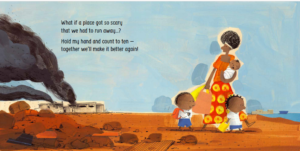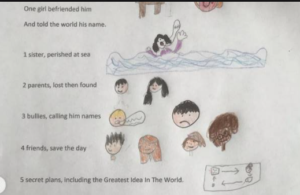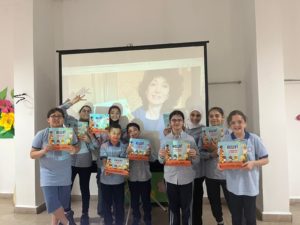Guest Blog by Hollis Kurman
‘Imagine you suddenly had to leave home because it was no longer safe – and you could take only what fits in your backpack. You’re not sure when (or whether) you’ll be back. What would you bring?’ This is the question I ask children at the start of my author visits and readings of my picture book, ‘Hello! A Counting Book of Kindnesses’ (Otter-Barry Books). It is an impossible question, yet I ask it anyway, as it creates a direct route to empathy for refugees. I show the opening spread of my book, depicting in bright colours a mother and her three young children running away from a bombed or burning village. The young boy carries a backpack. What might he have packed just before they fled? What would you grab on your way out?
Tentatively at first, and then with increasing fervor, the children begin to volunteer ideas. Their hands shoot up. Regardless of age, almost every group mentions bringing a cuddle toy for comfort and company – and some of them hope that their real pets might fit. Beyond the practical items they add to the list (food, water, phone, clothes, perhaps an extra pair of shoes for all that walking), two other telling categories generally sneak in: reminders of home and something to do.
When forced to flee, reminders of home can be a double-edged sword. Nothing can soothe the spirit like a picture or video of a loved one left behind; a blanket Granny made that still carries a sweet bedroom smell; a handwritten note or friendship bracelet from a best friend; the cat’s fallen whisker. A drawing. But these same items can make hearts ache like nothing else, especially when return is uncertain. A refugee’s loss of home fits with what therapist Dr. Pauline Boss calls ‘ambiguous loss’. The unresolved grief that comes with not knowing if a safe return home – or even reuniting in a new place with family and friends – will ever be possible. The mourning feels both premature and incomplete. And yet no backpack would be complete without these bittersweet mementos.
On a more mundane level, the boredom and sense of limbo of a refugee’s journey is often overlooked. Fear and anxiety rightly get the lion’s share of attention, but the black-out of the past and present coupled with the blank space of the future also take their toll. This can be particularly acute in children who have known only conflict and/or escape in their young lives. How to divert the mind and keep hope alive on this difficult, tedious road? I read an interview with a conflict refugee who confessed that she couldn’t bear the sight of jigsaw puzzles, as her family had spent uncountable hours doing puzzles while hiding in a dark basement when she was a child. Reminded, too, of my student research into the Soviet dissidents locked away in the gulag, I remembered how valuable the storytellers among them became. A good story was worth extra food rations or other perks in the camps. Anything to break the monotony and prevent the mind closing in on itself.
And so, my young readers propose packing diversions in their backpacks: a book, a game, a ball. I also suggest bringing along a notebook and pen. ‘If I get scared or bored,’ I tell them, ‘It always helps to write or draw something.’ They take note and nod. Some of them even send me their drawings afterwards, and I keep them all.
I recently did a virtual reading of ‘Hello! A Counting Book of Kindnesses’ for a class with Teach for Lebanon. This school is close to the conflict zone, and the class was made up largely of Syrian and Palestinian refugee children. Keenly aware of my responsibility as an author treating such a sensitive subject at such a sensitive time, I wanted these beautiful refugee children to feel seen, respected, and no longer alone. I also wanted to learn from them and to hear what they had put in their own backpacks – or how they might have packed differently for the journey in hindsight.
It turned out, however, that their answers and energy were virtually indistinguishable from those of their Lebanese classmates. I took this as a hopeful sign of our common humanity and the backpack we all carry inside of us.
Hollis Kurman
https://holliskurman.com
IG: holliskurman_writer
X: HollisKurman


